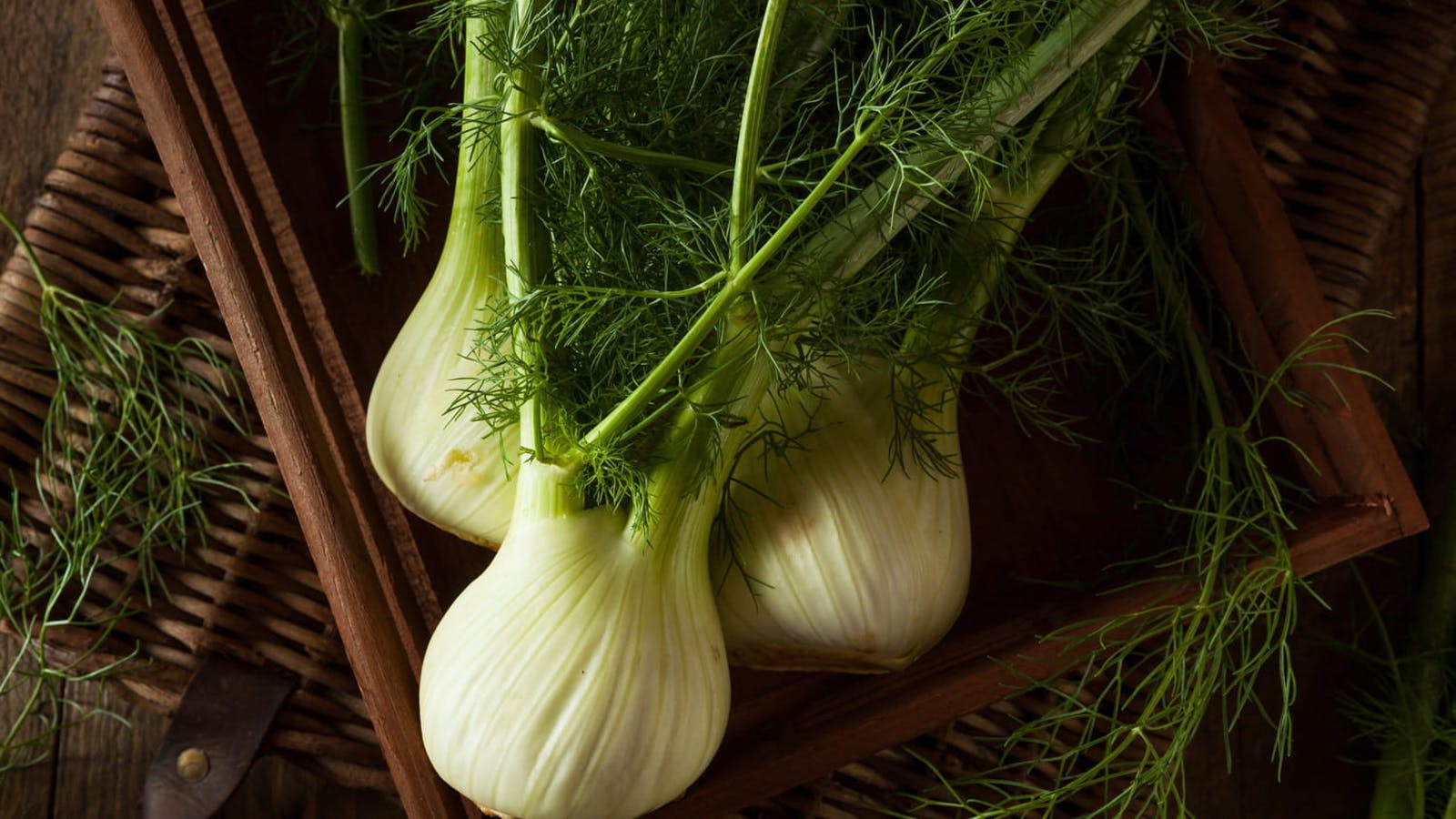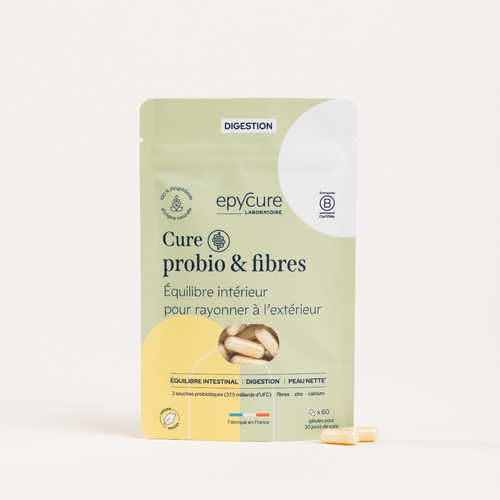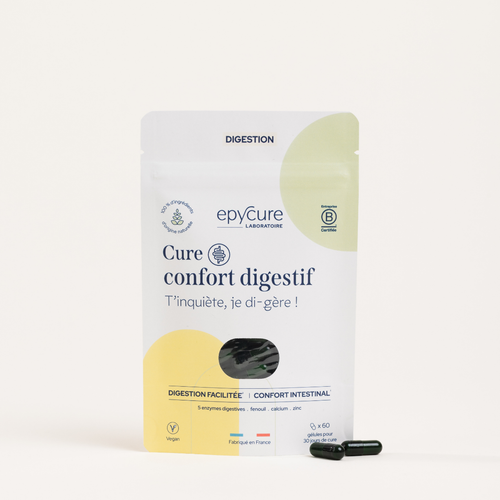Between temporary disorders (diarrhea, constipation, etc.), digestive pathologies (Crohn's disease, ulcerative colitis) or even metabolic syndrome (irritable bowel syndrome), approximately 50% of French people are affected by these digestive disorders .
Irritable bowel syndrome (IBS), also known as irritable bowel syndrome, has gained widespread recognition over the past 10 years. While diagnosis remains complicated and treatment unclear , there are some ways to relieve it naturally.
Irritable Bowel Syndrome: What is it?
It is associated with intestinal dysfunction : abdominal pain, digestive discomfort, intestinal transit disorders (constipation, diarrhea, etc.). Affecting 3 women for 1 man (around 5% of the French population) but without apparent severity , it nevertheless impacts the quality of life of those affected due to its chronicity and pain.
Symptoms and diagnosis
They will range from simple stomach ache , to bloating or even transit problems such as constipation or diarrhea.
Diagnosis is not so simple; there is no specific test to identify IBS. Because of its non-specificity, its diagnosis is made by eliminating diseases recognized for the same symptoms, a slow and restrictive process, and in the vast majority of cases between the ages of 30 and 40.
No abnormality whatsoever on a blood test or an X-ray, we then speak of “functional” pathology , it will occur if these 3 signs are present:
- Abdominal pain and intestinal transit disorders
- Symptoms more than 6 months old
- At least 1 symptom per week during the last 3 months
Then, the diagnosis of IBS is made on the basis of the Rome IV criteria where these three signs must be associated with at least 2 of the following criteria:
- Related to defecation
- Associated with a change in stool frequency
- Associated with a change in shape (appearance) of stools
Causes of irritable bowel syndrome
Of multiple causes, they are mainly linked to hypersensitivity of the intestine to external or sometimes internal factors, fatigue, stress, psychological factors such as anxiety, anguish, the occurrence of difficult events or even gastroenteritis. The factors of an unbalanced diet do not promote the occurrence but amplify the symptoms.
How to relieve irritable bowel syndrome?
Unfortunately, there are no medications that specifically treat and cure irritable bowel syndrome; only antispasmodic or pain-relieving medications can be prescribed in cases of severe symptoms. The preferred treatment in this type of case is a lifestyle and dietary adjustment (diet and physical activity) to maximize quality of life.
What to eat to relieve irritable bowel syndrome?
Diet plays a role in relieving IBS. Certain foods and methods contribute to digestive discomfort. The goal is to reduce these to improve patients' quality of life .
- Limit FODMAPs
These are small sugar molecules found in many foods today as energy sources for the body. They include fermentable sugars, oligo-, di-, and monosaccharides, as well as polyols.
Their problem? They cause absorption difficulties when ingesting food, which leads to gas and bloating due to fermentation. Therefore, favor low-FODMAP foods to limit these symptoms.
|
Foods high in FODMAPs |
Low FODMAP foods |
|
Vegetables Artichokes, garlic, onions, tomatoes, mushrooms, leeks… Fruits Apple, cherries, mango, nectarine, pear, peach, plum… Dairy products Cow's milk, yogurts, ice cream... Cereals Biscuits, wheat, rye and barley breads, breakfast cereals... Protein sources Marinated meats, legumes, marinated seafood… |
Vegetables Eggplant, green beans, pepper, carrot, cucumber, lettuce… Fruits Grapes, kiwis, tangerines, pineapples, strawberries… Dairy products Almond milk, brie, camembert, feta… Cereals Rice, sourdough bread, spelt bread, corn and quinoa flakes… Protein sources Eggs, firm tofu, cooked meats, seafood, tempeh… |
Avoid all intake of “bad fats” , carbonated drinks or even alcoholic drinks which can cause discomfort (gas, bloating) and digestive problems.
- Eat slowly - 3 meals a day
Taking your time to eat and eating at regular times facilitates digestion by allowing the body time to assimilate the ingredients. Snacking leads to incomplete digestion and eating too close to meals, which destabilizes the stomach, which can no longer perform its function properly.
- Hydration
Hydration is a key factor for good digestion. It is recommended to consume 2L per day , through still water and herbal teas or infusions, for its draining effect which helps to evacuate toxins and thus facilitate digestion .
4 practices to adopt to relieve symptoms:
-
Rebalance your intestinal flora
Balancing your intestinal flora is essential for proper digestion . Probiotics and prebiotics are responsible for this balance and regulate digestion. In cases of digestive problems, the consumption of products rich in probiotics is strongly recommended, thus reducing IBS symptoms.
Furthermore, taking probiotics and prebiotics in the form of food supplements is widespread. Our Probiotic & Fiber Cure provides everything the body needs to maintain intestinal balance , thus promoting better digestion .
-
Practice self-massage of the stomach
Often used for slimming purposes, this massage with gentle, circular movements , also called self-massage, relieves digestive discomfort . These movements have a stimulating and draining effect on the body against gases caused by excessive fermentation in the body which causes intestinal pain. It helps restore intestinal transit , thus facilitating the elimination of stools and flatulence .
To perform your massage, place your hands on your stomach , on either side of the navel, horizontally, and inhale. As you exhale, gently press your stomach as if you were trying to join your two hands . Note that this exercise should not be done immediately after eating, but rather on an empty stomach in the morning or evening.
-
Using Peppermint Essential Oil
Studies have shown that the use of peppermint essential oil , in oral form, has been shown to be effective against pain and overall symptoms in people with irritable bowel syndrome.
-
Relieve stress with cardiac coherence, meditation or hypnosis
Stress is closely linked to the onset of IBS symptoms. It impacts digestion in two ways: through hormones and through intestinal motility . On the one hand, stress hormones are released by the brain and affect intestinal function. On the other hand, stress also alters bowel movement by physically affecting contractions and therefore intestinal transit.
Several methods have shown their effectiveness in managing stress on the digestive impact:
-
Yoga - Cardiac Coherence
Deep breathing can help with stress . Studies have shown that yoga classes improve anxiety and quality of life in people with bowel disorders, reducing stress and significantly improving the ability to manage symptoms.
-
Hypnosis
Hypnotherapy involves mindful concentration , it is said to be able to reduce the perception of pain by 50% and play a role in the nervous system involved in irritable bowel syndrome.
Following a long-term treatment: Digestive comfort VS Probiotic & fiber treatment, which should you choose?
Often used as a preventative measure , the basic treatment helps maintain the body's good condition in the face of IBS symptoms. As a first-line treatment, a probiotic treatment is prescribed by a doctor to restore the balance of the intestinal microbiota and prevent attacks , which can be supplemented by the Digestive Comfort Treatment , effective for reducing digestive discomfort and regulating transit . This combination of treatments then becomes a complete routine for the treatment of IBS by relieving pain and influencing the balance of your microbiota.
Why choose when you can have both?





